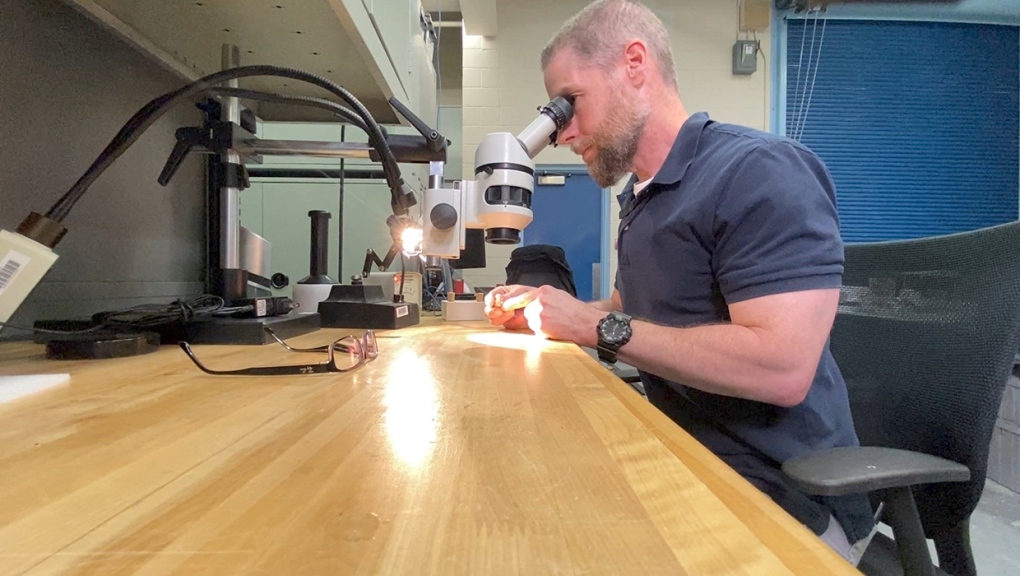Royal Tyrrell researchers exploring fossils of previously unknown early primates
In the back halls of the Royal Tyrrell Museum of Palaeontology, flanked by shelves of huge fossils the likes of triceratops, and albertasaurus, Craig Scott peers through a microscope at the tiny jawbones of a pair of previously-unknown species of early primates.
"The mammalian fossil record is dominated by teeth because enamel resists the processes of fossilization. So, in a way, we're paleo-dentists, we study teeth a lot," said Scott, who is the Tyrrell Museums’s director of preservation and research.
“These species, along with all of their relatives occur very, very low in the primate family tree. They were an early branch, and several of them were, I guess, "interesting evolutionary experiments" would be the best way to put it, in that they existed for a certain period of time and went extinct.”
The prehistoric primates Scott is studying were not ape-like primates. Rather, they were tiny - the size of a large rodent - and looked something like small lemurs.
“They probably didn't have forward-facing eyes. Their eyes faced a little bit more laterally to the sides, like you'd see in tree squirrel, for example," said Scott.
“Their brains were not particularly enlarged compared to their body size, and they probably did have various features (like hands, ankles and fingers adapted for grasping braches) that allowed them to live in trees.”
 Craig Scott, from the Royal Tyrell Museum of Palaeontology in Drumheller, Alta.
Craig Scott, from the Royal Tyrell Museum of Palaeontology in Drumheller, Alta.
FOUR SITES IN CALGARY
The fossils were only recently identified as a new species of primate, even though they were discovered between the 1990s and early 2000s, at four sites in the Calgary and Cochrane area. Those include a site in Calgary's Edworthy Park, and one in Glenbow Ranch Provincial Park which are reflected in the names Scott gave the new species: “Edworthia Greggi” and “Ignacius Glenbowensis”
The other two locations include an exposed cut bank along West Nose Creek in northwest Calgary and a rail line right of way on the eastern edge of Cochrane.
Even though the animals eventually went extinct Scott says the discovery of the new species helps fill a gap the understanding of human evolutionary history.
“As human beings, we have a vested interest really, in understanding about the evolutionary history of our lineage," Scott said. "Although these things may seem so distant and remote from that, they represent parts of the very beginnings of human beings, really. So, if you have any interest whatsoever in the in the evolution of humans, and primates, more generally, these will be very important.”
DIFFERENT CLIMATE
The discovery also bolsters the idea of western Canada and even the high Arctic having a much different climate and landscape in the distant past.
“It suggests that it was a very interesting ecosystem that was quite different from what we see today. The climate back then, was something that you would see in present day Louisiana or maybe the Everglades," said Scott.
“We're talking about subtropical environment, lots of rainfall, humidity, the landscape is populated by lush forests, adjacent to rivers and streams.”
 The new primates have been given the names “Edworthia Greggi” and “Ignacius Glenbowensis."
The new primates have been given the names “Edworthia Greggi” and “Ignacius Glenbowensis."
WASHED AWAY
The sites from which Edworthia Greggi and Ignacius Glenbowensis were discovered were washed away in the 2013 flood, but Scott expects many more early primate fossils to be discovered, in the future, all across Alberta.
"All the work that's been done previously, really has only scratched the surface," said Scott
"Given the amount of rock that's in the province, and its very well-established, fossil history, we almost certainly will be encountering new species in the future."
If you discover a fossil, or what you think, may be a fossil, don’t dig it up and take it home. if you do that, you could be breaking the law.
Instead photograph it, carefully note the location, and contact the Royal Tyrrell Museum. https://tyrrellmuseum.com/research/found_a_fossil
CTVNews.ca Top Stories

2nd woman found dead in English Bay: Vancouver police
For the second time in as many days, a woman's body was found near Vancouver's shoreline Monday.
2 Albertans accused of threatening to kill Trudeau, Freeland, Singh
Men from Edmonton and Calgary are accused of threatening to kill some of Canada's top government leaders.
Athletes show off stylish and expensive team clothing for the 2024 Olympic Games
Canadian athletes attempting to reach the podium at the Paris 2024 Olympic Games will also be looking fashionable for the entire world to see.
Harris has support of enough Democratic delegates to become party's presidential nominee: AP survey
Vice-President Kamala Harris has secured the support of enough Democratic delegates to become her party's nominee against Republican Donald Trump, according to an Associated Press survey taken in the aftermath of President Joe Biden's decision to drop his bid for re-election.
Four suicides in New Zealand linked to Ontario's Kenneth Law
New Zealand's coroner has ruled that four of its citizens died after ordering products from an Ontario man who is facing murder charges for selling poisonous substances.
Toronto woman charged with voyeurism after taking 'intimate' photos during massage: police
A Toronto woman who allegedly took 'intimate' photos of an individual who was getting a massage has been charged with voyeurism, police say.
IN PICTURES Here's what Calgary's new event centre 'Scotia Place' will look like
The name of Calgary’s new event centre was unveiled on Monday. The arena will be called Scotia Place.
Harris steps into the limelight. And the coconut trees and memes have followed
If you're trying to get up to speed on Vice President Kamala Harris' swift emergence as Democrats' possible nominee this fall, you really need to know your memes.
These are the four leading vice-presidential picks for Kamala Harris' campaign
No one knows the importance of selecting the right running mate better than Vice President Kamala Harris.

































